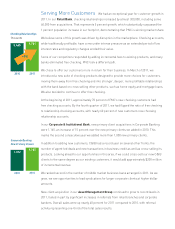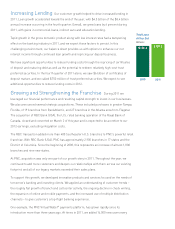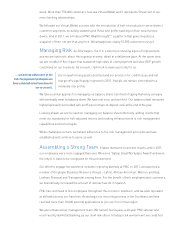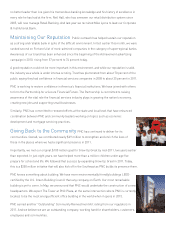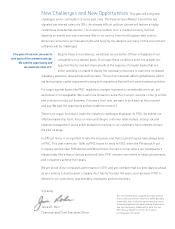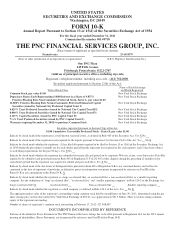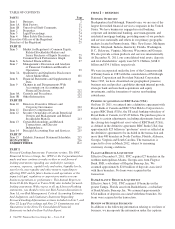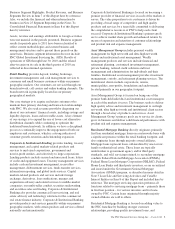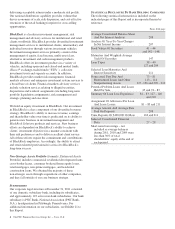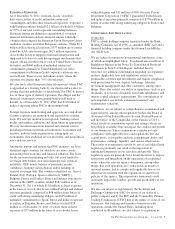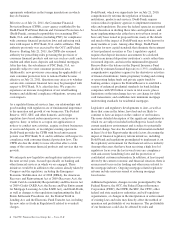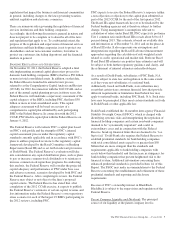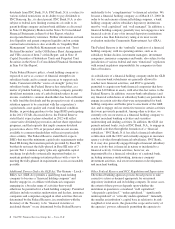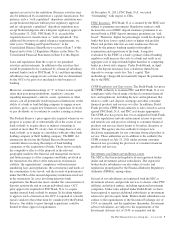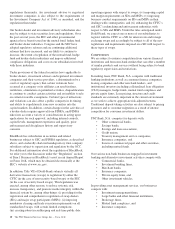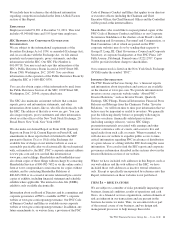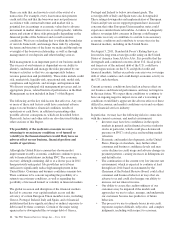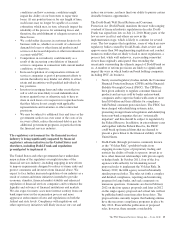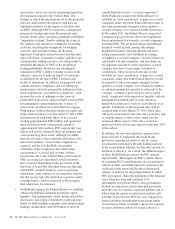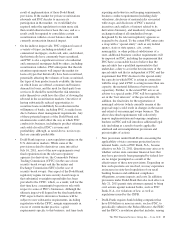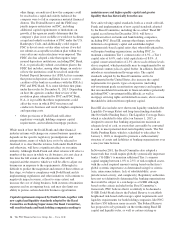PNC Bank 2011 Annual Report Download - page 15
Download and view the complete annual report
Please find page 15 of the 2011 PNC Bank annual report below. You can navigate through the pages in the report by either clicking on the pages listed below, or by using the keyword search tool below to find specific information within the annual report.appropriate authorities in the foreign jurisdictions in which
they do business.
Effective as of July 21, 2011, the Consumer Financial
Protection Bureau (CFPB), a new agency established by the
Dodd-Frank Wall Street Reform and Consumer Protection Act
(Dodd-Frank), assumed responsibility for examining PNC
Bank, N.A. and its affiliates (including PNC) for compliance
with consumer financial protection laws and enforcing such
laws with respect to PNC Bank, N.A. and its affiliates. This
authority previously was exercised by the OCC and Federal
Reserve. Starting July 21, 2011, the CFPB also assumed
authority for prescribing rules governing the provision of
consumer financial products and services such as credit cards,
student and other loans, deposits and residential mortgages.
After this date, the subsidiaries of PNC Bank, N.A. are
generally subject to state consumer protection laws.
Additionally, new provisions concerning the applicability of
state consumer protection laws to national banks became
effective on July 21, 2011. Questions may arise as to whether
certain state consumer financial laws may be preempted with
respect to PNC Bank, N.A. after this date. We expect to
experience an increase in regulation of our retail banking
business and additional compliance obligations, revenue and
costs impacts.
As a regulated financial services firm, our relationships and
good standing with regulators are of fundamental importance
to the operation and growth of our businesses. The Federal
Reserve, OCC, SEC, and other domestic and foreign
regulators have broad enforcement powers, and powers to
approve, deny, or refuse to act upon our applications or
notices to conduct new activities, acquire or divest businesses
or assets and deposits, or reconfigure existing operations.
Dodd-Frank provides the CFPB with broad enforcement
powers over PNC Bank, N.A. and its affiliates with respect to
compliance with consumer financial protection laws. The
CFPB also has the ability to issue rules that affect a wide
range of the consumer financial products and services that we
provide.
We anticipate new legislative and regulatory initiatives over
the next several years, focused specifically on banking and
other financial services in which we are engaged. These
initiatives would be in addition to the actions already taken by
Congress and the regulators, including the Emergency
Economic Stabilization Act of 2008 (EESA), the American
Recovery and Reinvestment Act of 2009 (Recovery Act), the
Credit Card Accountability Responsibility and Disclosure Act
of 2009 (Credit CARD Act), the Secure and Fair Enforcement
for Mortgage Licensing Act (the SAFE Act), and Dodd-Frank,
as well as changes to the regulations implementing the Real
Estate Settlement Procedures Act, the Federal Truth in
Lending Act, and the Electronic Fund Transfer Act, including
the new rules set forth in Regulation E related to overdraft
charges.
Dodd-Frank, which was signed into law on July 21, 2010,
comprehensively reforms the regulation of financial
institutions, products and services. Dodd-Frank requires
various federal regulatory agencies to implement numerous
rules and regulations. Because the federal agencies are granted
broad discretion in drafting these rules and regulations, and
many implementing rules either have not yet been issued or
have only been issued in proposed form, many of the details
and much of the impact of Dodd-Frank may not be known for
many months or years. Among other things, Dodd-Frank
provides for new capital standards that eliminate the treatment
of trust preferred securities as Tier 1 regulatory capital;
requires that deposit insurance assessments be calculated
based on an insured depository institution’s assets rather than
its insured deposits, and raises the minimum Designated
Reserve Ratio (the balance in the Deposit Insurance Fund
divided by estimated insured deposits) to 1.35%; establishes a
comprehensive regulatory regime for the derivatives activities
of financial institutions; limits proprietary trading and owning
or sponsoring hedge funds and private equity funds by
banking entities; requires the Federal Reserve to establish a
variety of enhanced prudential standards for bank holding
companies with $50 billion or more in total assets; places
limitations on the interchange fees we can charge for debit
card transactions; and establishes new minimum mortgage
underwriting standards for residential mortgages.
Legislative and regulatory developments to date, as well as
those that come in the future, have had and are likely to
continue to have an impact on the conduct of our business.
The more detailed description of the significant regulations to
which we are subject included in this Report is based on the
current regulatory environment and is subject to potentially
material change. See also the additional information included
in Item 1A of this Report under the risk factors discussing the
impact of financial regulatory reform initiatives, including
Dodd-Frank and regulations promulgated to implement it, on
the regulatory environment for the financial services industry.
Among other areas that have been receiving a high level of
regulatory focus over the last several years are compliance
with anti-money laundering laws and the protection of
confidential customer information. In addition, at least in part
driven by the current economic and financial situation, there is
an increased focus on fair lending and other issues related to
the mortgage industry. Ongoing mortgage-related regulatory
reforms include measures aimed at reducing mortgage
foreclosures.
Additional legislation, changes in rules promulgated by the
Federal Reserve, the OCC, the Federal Deposit Insurance
Corporation (FDIC), the CFPB, the SEC, the CFTC, other
federal and state regulatory authorities and self-regulatory
organizations, or changes in the interpretation or enforcement
of existing laws and rules may directly affect the method of
operation and profitability of our businesses. The profitability
of our businesses could also be affected by rules and
6The PNC Financial Services Group, Inc. – Form 10-K


